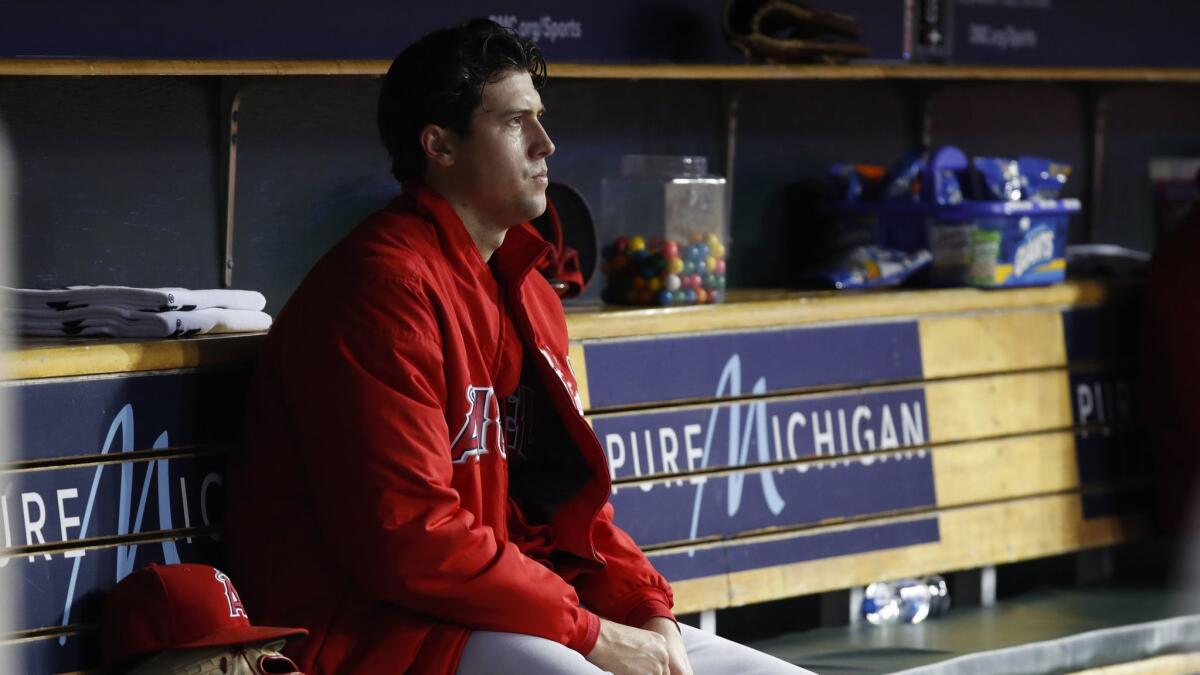Details of Tyler Skaggs’ death could trigger legal battle with millions at stake

How did Tyler Skaggs come to die with two opioids in his bloodstream, plus enough alcohol that he would have been considered legally impaired?
Investigations into that question could determine whether the Angels and the family of one of their most popular players face off in legal proceedings that could take years and be worth tens of millions of dollars — or more.
The Skaggs family and the Angels each have retained attorneys based in Texas, where Skaggs died July 1 on the first day of a team trip to play the Texas Rangers and Houston Astros. The prospects of a wrongful-death lawsuit appear significant, given that the family‘s assertion in a statement Friday that they had learned the “circumstances surrounding Tyler’s death … may involve an employee of the Los Angeles Angels.”
That statement prompted Major League Baseball to launch an investigation. Police in Southlake, Texas — where the Angels were staying that night — have been investigating since Skaggs’ death. The attorney hired by the Skaggs family, Rusty Hardin, intends to pursue his own probe.
“We’re going to want to know how it came about that those drugs were ingested,” Hardin told The Times, “and whether or not others are responsible for what happened.”
The prospects of success for any wrongful death suit could depend on whether attorneys can identify a party besides Skaggs who might be at least partially responsible for his death, said Julie Cantor, who teaches law at UCLA.
“You need to have a wrongful act,” said Cantor, speaking generally because she has not reviewed any records in the Skaggs case.
Tyler Skaggs died by choking on his vomit after ingesting a dangerous mix of drugs and alcohol, raising questions about MLB’s and the Angels’ responsibilities.
Investigators likely would focus first on how Skaggs obtained the drugs. Under federal law, the opioids found in his system — fentanyl and oxycodone — are illegal to possess without a legitimate medical prescription.
The league could have records showing that Skaggs had a medical exemption to use the drugs, or that he had tested positive for them and had been referred to a counseling program. Major league players are not tested for so-called drugs of abuse without probable cause or participation in a treatment program.
Positive tests for drugs of abuse are not made public under the major league testing program, and neither are individual exemptions.
Skaggs’ family could waive confidentiality to obtain those records so investigators could discover whether an exemption or a positive test had existed, said Wylie Aitken, a prominent Orange County attorney who has tried wrongful death cases.
Aitken said investigators also would consider whether Skaggs obtained the drugs from a legitimate prescriber, then continue up the supply chain to the pharmacist and manufacturer.
Sign up for our free daily sports newsletter >>
Aitken said the Angels could be liable if a team employee furnished the drugs to Skaggs, even without the knowledge of the team.
“Even though it’s a third-party, somewhat rogue act, you could be held accountable for not monitoring your own employees,” Aitken said.
In the event of a lawsuit, and depending on the results of the investigations, Cantor said an employer could argue that it should not be held responsible for an employee’s addiction or recreational drug use.
That kind of behavior could reduce a damage award to the Skaggs family, Aitken said, but it would not necessarily absolve other parties of liability, depending on “who put all these lethal weapons in his hand in the first place.”
If the Skaggs family can show his death was wrongful, the damages could approach nine figures, and possibly go higher, experts say, including salaries he might have earned.
In addition, Skaggs and his wife, Carli, married in December and had talked of starting a family this winter. The law allows her to seek compensation for the wrongful loss of what would have been a long life of love, care and comfort, and for a jury to award whatever figure it might consider appropriate, Aitken said.
“That could be a multiple factor of what the economic loss is,” Aitken said.
Hours after finding out late teammate Tyler Skaggs died last month after ingesting a dangerous mix of drugs and alcohol, the Angels lost, 7-6, to the Boston Red Sox in 15 innings Friday.
Skaggs could have hit the open market at 29, an unusually young age for free agency. He had not had arm injuries since 2016. He was on pace to set a career high for innings pitched for a second consecutive season, and the ERA+ statistic ranked him as better than league average this year and last.
He could also have foregone free agency and signed a contract extension with the Angels during the coming winter. Among the pitchers who chose to sign a long-term deal last winter rather than play out their final year before free agency: Sonny Gray of the Cincinnati Reds (three years and $30.5 million at age 29); Carlos Carrasco of the Cleveland Indians (four years and $47 million at age 32); and Miles Mikolas of the St. Louis Cardinals (four years and $68 million at age 30). All three had one finish within the top 10 of Cy Young Award voting; Skaggs had not.
In 2016, the singer Prince died of what authorities said was an accidental overdose of fentanyl. In 2018, the singer’s heirs filed a wrongful death lawsuit against several healthcare providers, including a doctor who prescribed drugs to the entertainer, claiming the doctor’s “departures from the standard of acceptable medical practice had a substantial part in bringing about Prince’s death” and that Walgreens pharmacists had dispensed “prescription medications not valid for a legitimate medical purpose,” which also allegedly contributed to his death.
The defendants have denied the allegations. The suit is pending.
“Prince’s family wishes, through its investigation, to shed additional light on what happened to Prince. At the same time further light on the opiate epidemic will hopefully help the fight to save lives,” the attorneys representing his heirs said when they filed the lawsuit. “If Prince’s death helps save lives, then all was not lost.”
More to Read
Go beyond the scoreboard
Get the latest on L.A.'s teams in the daily Sports Report newsletter.
You may occasionally receive promotional content from the Los Angeles Times.









